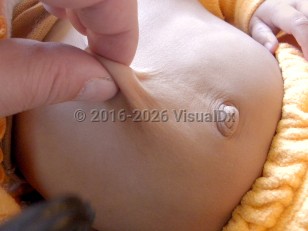Dehydration in Infant/Neonate
Alerts and Notices
Important News & Links
Synopsis

Patients of all demographics are susceptible to dehydration. Pediatric patients are at greater risk of dehydration. Young children and infants are particularly vulnerable, as they are unable to identify and communicate thirst or access fluids independently. Children have increased insensible losses due to fevers, burns, and other disease states and can become dehydrated more readily than adults.
Dehydration is generally classified as mild (3%-5% volume loss), moderate (6%-9% volume loss), or severe (> 10% volume loss). The signs and symptoms vary greatly depending on severity of dehydration. Symptoms can range from a mild decrease in urine output to lethargy, hypotension, changes in mental status, poor tissue perfusion, and shock.
Dehydration is a clinical diagnosis based on history and physical examination. Diagnosis of dehydration may be suspected by acute changes in body weight of the pediatric patient and changes in osmolality based on laboratory tests. Physical examination findings such as vital sign changes, skin turgor, and capillary refill time of 3 seconds or more will aid in the diagnosis. Often, pediatric patients will have an increase in respiratory rate and tachycardia before any changes in blood pressure from dehydration.
Children with urinary concentrating defects, uncontrolled diabetes mellitus, and cystic fibrosis are at increased risk for dehydration.
Codes
E86.0 – Dehydration
SNOMEDCT:
34095006 – Dehydration
Look For
Subscription Required
Diagnostic Pearls
Subscription Required
Differential Diagnosis & Pitfalls

Subscription Required
Best Tests
Subscription Required
Management Pearls
Subscription Required
Therapy
Subscription Required
Drug Reaction Data
Subscription Required
References
Subscription Required
Last Updated:03/03/2024

